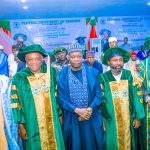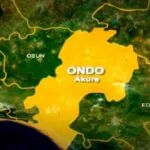
The Chairman of the Senate Committee on Appropriations, Senator Solomon Adeola, has clarified that no legislator received a single kobo from funds allocated for constituency projects, stating that the procurement and execution of such projects rest solely with the relevant Ministries, Departments, and Agencies (MDAs).
Adeola, who represents Ogun West Senatorial District, also emphasised that Nigeria’s budget is not merely a set of figures but a policy document designed to serve the holistic interests and well-being of the Nigerian people.
He made this assertion while delivering a lecture titled “The Role of the Legislature in Shaping a Holistic Budget for Nigeria” over the weekend at the 2nd Annual Retreat of the Remo Traditional Council in Sagamu.
According to the senator, constituency projects—an agreed sum allocated to each legislator for inclusion in the budget for their respective federal constituencies or senatorial districts and domiciled in MDAs for implementation—should not be viewed as padding or insertions.
He explained that since 1999, there has been widespread misconception about the role of the legislature in the budget process, with terms like budget padding, insertions, and constituency projects often used pejoratively to cast unjust aspersions on lawmakers.
“There is a lot of misinformation and sometimes outright falsehood surrounding the budget in Nigeria. The legislature is often wrongly portrayed as the villain in our budgeting process. Accusations such as ‘budget padding’, ‘insertions’, and ‘constituency projects’ are regularly thrown around in the media, creating confusion and casting aspersions on parliamentarians,” he said.
Addressing about 40 traditional rulers from Remoland, Senator Adeola walked them through the budgetary process, citing Sections 80 to 84 of the 1999 Constitution as the legal foundation for the National Assembly’s appropriation powers. He noted that no public fund can be spent without prior approval by the National Assembly.
“The legislature has a duty to ensure that no part of the country is neglected. The developmental needs across Nigeria are diverse. That is why each senator and member of the House of Representatives is expected to advocate for the needs of their constituents for possible inclusion in the national budget. If successful, this is not padding or insertion—it is a legitimate use of legislative power in the interest of the people,” he explained.
He added that what is often described as budget padding or insertion is in reality a form of legislative intervention that has brought development to previously neglected areas. Without such input, he said, many communities would never experience a “federal presence.”
“This is democracy in action—a government of the people and for the people,” he stressed.
ALSO READ FROM NIGERIAN TRIBUNE: Tinubu departs Saint Lucia for BRICS Summit in Brazil
Senator Adeola, who took a break from the 2-Day South-West Zonal Constitution Amendment Public Hearing to deliver the lecture, also pledged his support for granting constitutional roles to traditional rulers, recognising their importance in governance, peacebuilding, security, and community development.
Earlier, the Akarigbo and Paramount Ruler of Remoland, Oba Babatunde Ajayi, who presided over the event, thanked the senator for illuminating his palace with solar-powered streetlights and for various developmental projects across the state.
Oba Ajayi noted that the retreat was organised to broaden the understanding of traditional rulers and to advocate for increased development in Remoland. He also called for the establishment of a federal educational institution in the area and urged that Remoland should not be marginalised in the event of the creation of Ijebu State.
WATCH TOP VIDEOS FROM NIGERIAN TRIBUNE TV
- Let’s Talk About SELF-AWARENESS
- Is Your Confidence Mistaken for Pride? Let’s talk about it
- Is Etiquette About Perfection…Or Just Not Being Rude?
- Top Psychologist Reveal 3 Signs You’re Struggling With Imposter Syndrome
- Do You Pick Up Work-Related Calls at Midnight or Never? Let’s Talk About Boundaries






